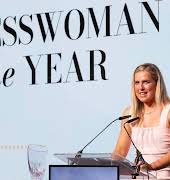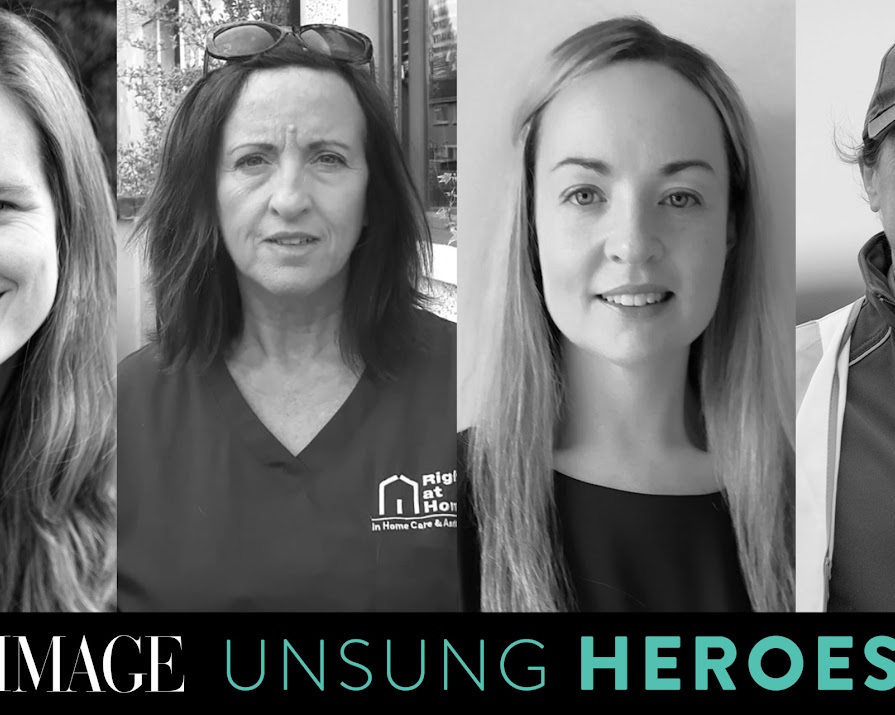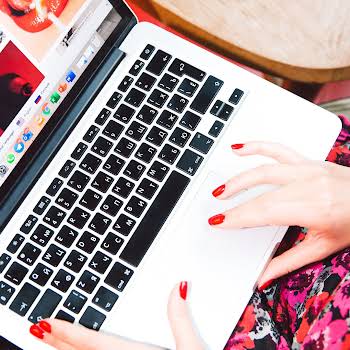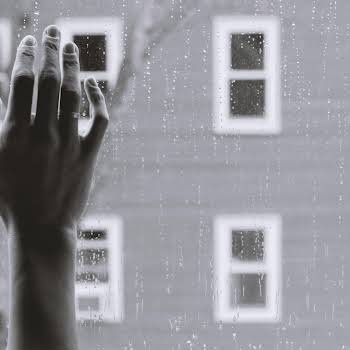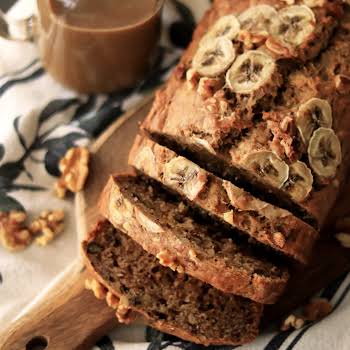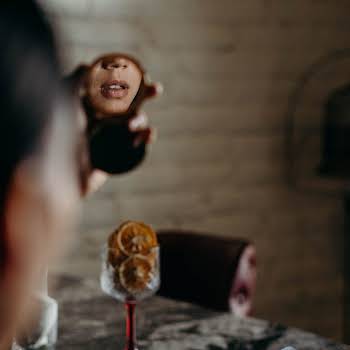
IMAGE Unsung Heroes: the forgotten frontline workers we want to recognise
By IMAGE
14th Apr 2020
14th Apr 2020
It goes without saying that the people who are tying themselves into full protective clothing to help the sick, while the rest of us pull on yesterday’s hoodie to tap at our laptops, are the ones that have our unerring respect and gratitude right now.
But there are so many others too that we are grateful for, some right at the frontline, others not – but all providing essential services.
The people delivering our babies, visiting the elderly at home, working the mental health ward. The work they do can not be ‘paused’ as so many other businesses are right now. They have to continue to get up, get dressed and get out there – these are their stories. Our unsung heroes.
Niamh McCullagh, Health Promotion Nurse, Saint John of God Hospital

“I have been working in the hospital here since 2003. I was a psychiatric nurse on the wards for 15 years but for the last two years I have been working as the hospital’s Health Promotion nurse. This means I am no longer assigned to a specific ward, I ‘float’ and I am available to all patients across all wards.
We help people here with all manner of mental illness, including anxiety, depression, psychosis, eating disorders, addiction and elderly care. My role specifically is to look after their complete health.
Often a patient with a mental illness may neglect their physical health, so I work with patients one-on-one to talk to them about their diet, their physical activity and more. I am also a big believer in helping people to set their own personal goals, we make to-do lists and create a personal plan just for them.
We have fantastic grounds here in the hospital with tennis courts and a lovely Sli na slainte walk, so I will always suggest a walk and talk; people are much more relaxed to open up when strolling side-by-side.
I introduce some incredibly simple yet effective concepts: movement is exercise and relaxation is simply pressing pause – you don’t need to go jogging or join a fancy yoga class to experience either.
Since Covid-19 struck, life in the hospital is very different. While we have no active cases at present, daily life for patients and staff is different. Non-essential out-patient appointments are cancelled, no visitors are allowed.
We normally encourage our patients to avail of leave from the hospital for a few hours to attend an appointment or meet a friend but for now leave is cancelled, in line with best practice. Our group meetings are all reduced in numbers so we can observe social distancing protocols.
One of the key areas I am coaching my patients on, is mindful social media use. Twenty-four hour news feeds do not help anyone at the moment, least of all patients with mental health issues.
Obviously from a hospital administration point of view, we have all our protocols in place (isolation beds ready, etc) to be best prepared for an outbreak of the virus in the hospital.
Right now, it’s fear and anxiety that we are dealing with. One of the key areas I am coaching my patients on, is mindful social media use. Twenty-four hour news feeds do not help anyone at the moment, least of all patients with mental health issues.
I try to get them to pull away from their phones, to choose just one social media outlet and only check in maybe once or twice a day. And try and take a complete break for a full day every so often. Decide what you need to know and who you need to keep in touch with and weed out anything else that is only adding to anxiety.
For the staff in the hospital we are continuing as ‘normal’ as best we can. Of course we are all practising social distancing and rigorous hand washing but we are continuing to work our day-to-day schedules in order to support our patients and create as calm and safe an environment for them as possible.”
Interview by Lizzie Gore Grimes
If you know anyone who may need mental health support at this time Niamh highly recommends the website yourmentalhealth.ie
Carolyn Coughlan, self-employed community midwife

“All of the community midwifes around the country have been saying that their phones are hopping these days. Usually women contact us very early on in their pregnancy but we’re getting a lot of enquiries now from women who had planned to have a hospital birth but who are now considering a different option.
Perhaps they have a fear of going into hospital, or maybe they have a fear of being alone and maybe not having their birth partner with them in hospital.
The Home Birth Service that we offer is free of charge and funded by the HSE. The wonderful thing about this service is that it’s community-based and you build up this lovely, trusting relationship with your midwife. We come to the house for the birth and then we look after them postnatally for about two weeks with five home visits.
The practice has changed slightly since Covid-19 — obviously we ring the women before we visit them to make sure they don’t have any signs like a high temperature or a cough. And we try to do a lot of the talking aspect of the visit over the phone. There is obviously a clinical aspect but we try to do as much talking over the phone as possible to reduce the amount of exposure.
All of us are experienced midwives who know how to minimise risk so although these are extraordinary times, we are well prepared to cope.
We wear aprons and masks, I bring my own soap, towel and alcohol gel and we try as much as possible to keep a distance during the appointment. All of us are experienced midwives who know how to minimise risk so although these are extraordinary times, we are well prepared to cope.
I imagine birthing at home for women with no complications would be an especially wise choice at the moment as it massively reduces the number of people with whom you need to come into contact.
I feel very privileged to be able to facilitate and help women who choose to birth at home and provide this service. I used it myself as a pregnant woman and it’s a wonderful service to have.”
Interview by Katie Byrne
Bernie Ronan, postwoman

“My day starts in the sorting office. You’re working with a lot of people and we all have to be careful of one another and keep our distance and do things we didn’t have to do before. It’s hard but we get through it and we manage.
I leave Kinsale and then I go in the direction of Robert’s Cove and then down to Rocky Bay — it’s beautiful but a lot of it is very rural and there’s a lot of elderly people there.
They love to see us postpeople coming and we’re probably the only people they see every day at the moment. They’re nearly looking out the window for us!
They may not see anybody else from one end of the day to the next. If they have family, they can’t visit them. A lot of them are spinsters — men and women — in their eighties. And if they’re not spinsters, they’re widowers.
They’re the ones I worry about looking in on mostly. And there’s quite a lot of them, to be honest. They can see you coming and they’re just waiting — even if it’s from a distance — just to have that little bit of chat for a few minutes.
I’ve noticed in the last few weeks that some people leave post in an envelope for us to post, sometimes with stamps, sometimes with money for stamps, and then they’ll wave to you from a distance.
There’s a few newspaper deliveries too — and that’s working out fine. If anyone wants anything they know to ask us and we just get it for them. Even if we’re not stopping in, we’re passing by so they know they can wave us down if they need anything.
I kind of know all my customers and I know the ones to look in on who don’t have anyone else coming by — I just do that anyway. A lot of us do.
And to be fair, elderly people, when they don’t have anybody, they’re not shy about asking — they don’t have a choice. Their neighbours are good too, but they have to keep their distance.
It does take a toll. I have sanitiser in my van and, honestly, I use it constantly because of the letter boxes and the door handles and the gates. I’m conscious of everything I touch and it is draining.
When I get home I take a deep breath and just think, I got through another day. I’m lucky where I live, I have a nice big garden so we just sit out the back and chill with a cup of coffee or tea. And I just relax for a little bit and take it all in.”
Interview by Katie Byrne
Valerie Saunders, home carer with Right at Home

“I buried my father at the end of February so I could be doing with being around my family at times like this, but I can’t. You have to put all that aside and go out and go to work because [clients] really, really need you. They depend on you, and more so now.
“I nursed my mother through cancer 20-odd years ago and then I stayed living in the family home with my father. I’ve always loved older people. I love hearing their stories. And I love to know that I’m making a difference.
The older people love to see someone — and they love a chatterbox! And I’m a good listener. I’m down to earth. Nothing would bother me or surprise me.
I have one client in her 90s and the word ‘cocooned’ actually has her frightened. She cried the day it was announced on the news.
I work with four clients five days a week. I’ve always known my job was important but through this now I can see what a difference it makes. I have one client in her 90s and the word ‘cocooned’ actually has her frightened. She cried the day it was announced on the news.
I told her it’s just the word and every time that thought comes into your head you can change it with three good ones.
One thing she does find hard is not having the cup of tea and the cake with me. It’s for her own safety — we can’t eat and drink in clients’ homes now. I had to explain to her that it’s only temporary and everyone in the world has had to change something. I can still make you your tea, I tell her. But she’s worried about me not having the cup of tea with her.
I’ve taken up Reiki healing and this client loves to hear about the angels. I’ve always given her a kiss on the head and a hug when I’m going. It’s important to give your clients a hug because as people get older, they get touched less and less. But I can’t give her a hug now.
When I’m leaving she says, ‘I’m on my own!’. And I tell her ‘I’m leaving an army-full of angels with you. You’re not on your own’.
Another client doesn’t go out very often but knowing that she can’t really upsets her. So I say ‘speak to me, tell me how you’re feeling’. And then I’ll reassure her that it’s not for long.
I wash my hands as soon as I go into a client’s home these days and if I touch anything I make sure to wipe it down with antibacterial wipes. I always tell my clients ‘don’t be afraid to tell me to wash my hands — I won’t be insulted’.
And I keep my social distancing. When I knock on a client’s door they usually keep me in the hall because they have a few little things to say. Now, instead of chatting in the hallway first, I say you just go ahead and I’ll follow you in.
You do get a bit stressed — we all do — so I do a three-minute grounding exercise and I balance all my chakras in the morning before I go out. When I get home I have to have my hour of meditation. I go up to my room and I put on my water sounds and I relax for the hour.
I have to look after myself because if I fall down there’s four people falling down with me.”
Interview by Katie Byrne
Read more: Grocery workers are putting themselves at risk for us. It’s time we thanked them
Read more: Meet the Botox doctors working on the Covid-19 frontline
Read more: The Irish charities looking for people to volunteer during Covid-19





